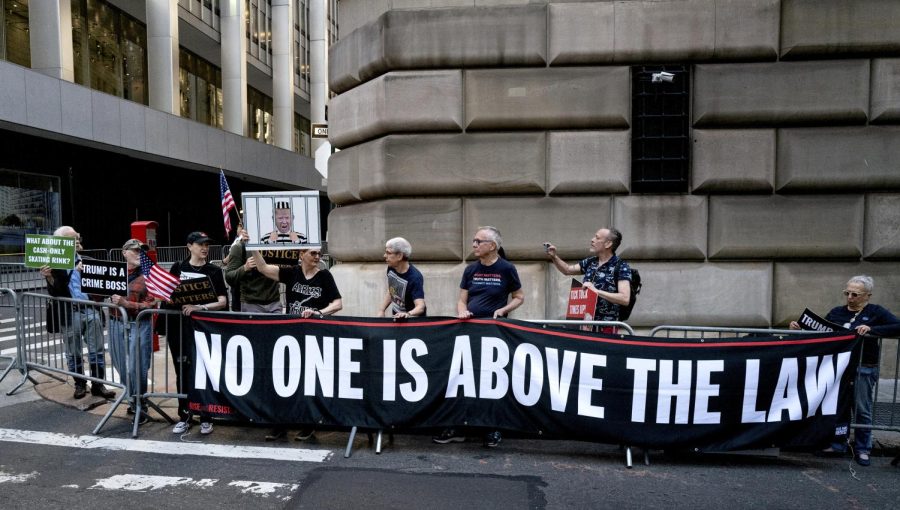Felony convictions should disqualify electoral candidates
Protesters gather before former President Donald Trump arrives in a motorcade for a deposition in New York Thursday, April 13, 2023. Opinion Columnist Emily Beebe believes Trump is a great example of why we need to hold elected officials to a higher standard of morals. (AP Photo/Craig Ruttle)
April 18, 2023
In a society that values justice and fairness, it is concerning when elected officials have a criminal history or potential criminal liability.
We expect our leaders to be virtuous and law-abiding citizens who can lead by example and maintain the integrity of our government. Unfortunately, recent events have shown us that this is not always the case.
One such example is former President Donald Trump, who has been indicted on 34 counts of felony charges. Trump is the first former president to be indicted, according to ABC News. This raises important questions about how we choose our elected officials and whether they should be held to a higher standard of ethical conduct.
Political science professor Scot Schraufnagel says that the odds of Trump being proven guilty are pretty slim and even if he is proven guilty, he most likely won’t face any jail time.
“Trying to find somebody guilty that has, you know, the wherewithal to hire good attorneys is a very difficult process. If found guilty, this particular offense would probably not involve jail time, probably just a fine,” Schraufnagel said.
It is troubling to think that someone who has committed crimes or is facing potential criminal charges could hold public office and be responsible for making critical decisions that affect our lives.
According to Recording Law, there is nothing in the Constitution that prevents someone with criminal charges from running for office. There have even been instances of people that have run for office from prison.
According to Business Insider, both Eugene V. Debs in 1920 and Lyndon LaRouche in 1992, ran from prison, with Eugene V. Debs winning over 900,000 votes. However, we cannot trust that those who have acted unethically or illegally will act in the best interests of the public.
When an elected official is implicated in criminal activity, it undermines the public’s faith in our government and democratic process. It can create a perception that the system is rigged and that our leaders are not held accountable to the same laws that everyone else must follow.
In order to maintain the integrity of our democracy and our government, we must demand that our elected officials hold themselves to the highest standard of ethics. Any hint of potential criminal liability or wrongdoing should disqualify someone from public office.
It is our responsibility as citizens to hold our leaders accountable and to insist on transparency and honesty in our political system.
Trump’s recent indictment is a stark reminder of the importance of ethical conduct and accountability, not just in politics but overall. Anything less undermines the very foundations of our democracy and threatens our future as a free and just society.



